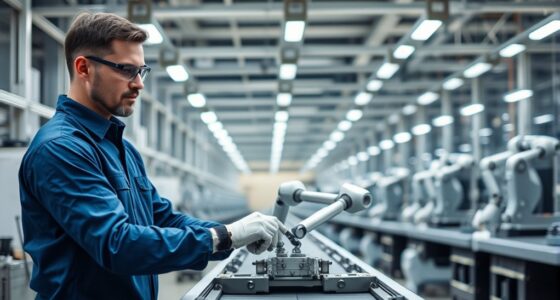To build career immunity against AI, focus on developing your human skills that AI can’t replicate, like empathy, creativity, judgment, and ethics. Roles in healthcare, skilled trades, leadership, and ethics rely heavily on these qualities, making them more resilient. Combining your strengths with AI tools enhances your value. If you keep exploring, you’ll discover how fostering these skills and understanding AI collaboration can help you stay adaptable in the evolving job landscape.
Key Takeaways
- Skills in empathy, emotional intelligence, and complex social interactions are highly resistant to AI automation.
- Creative thinking, imagination, and strategic judgment remain uniquely human strengths.
- Roles requiring physical expertise and problem-solving in unpredictable environments are less susceptible to AI.
- Ethical judgment, moral reasoning, and leadership qualities support job resilience against automation.
- Building relationships through presence and connectedness ensures human-centric careers resistant to AI replacement.
The Core Human Capabilities That AI Finds Challenging

While AI continues to advance rapidly, it still struggles to replicate the core human capabilities that define meaningful interactions and decision-making. You excel in empathy and emotional intelligence, connecting with others on a personal level—skills AI can’t fully emulate. Building relationships through presence, networking, and connectedness remains a distinctly human strength. Your judgment, opinion, and sense of ethics guide moral dilemmas and complex decisions, areas where AI falters. Creativity and imagination fuel your ability to innovate and solve problems uniquely. Leadership, hope, and vision inspire teams and shape strategy—qualities that AI cannot replicate. These core human capabilities create a foundation for work that requires nuance, intuition, and moral understanding—traits essential for roles AI isn’t equipped to handle. Research from MIT highlights that these skills are among the most resistant to automation, underscoring their importance in the future workforce. Additionally, the capacity for ethical reasoning ensures that human oversight remains critical in decision-making processes that involve complex moral considerations.
The Four Human Superpowers Protecting Careers From Automation

Your career is protected from automation by four core human superpowers that AI finds difficult to replicate. These skills enable you to excel where machines falter. Here’s a quick overview:
| Superpower | Why it’s essential | Examples |
|---|---|---|
| Empathy & Emotional Intelligence | Handling complex human emotions | Counseling, healthcare |
| Presence & Connectedness | Building relationships and networks | Leadership, sales |
| Judgment & Ethics | Making subjective and moral decisions | Law, ethics consulting |
| Creativity & Imagination | Generating original ideas | Art, innovation, design |
Mastering these superpowers ensures your role remains uniquely human, fostering resilience in an AI-driven world. Research shows that these capabilities are increasingly valued in future workplaces, emphasizing their importance for career longevity. Developing these skills aligns with the principles of mindfulness and self-awareness, which are vital components of personal growth and adaptability.
Sectors and Roles Most Resilient to AI Disruption

Certain sectors and roles stand out as highly resistant to AI disruption. Healthcare, skilled trades, leadership, and roles involving ethical judgment rely on human skills that machines can’t replicate. Understanding what makes these careers resilient helps you identify where human expertise remains essential. Emotional intelligence and complex decision-making are fundamental qualities that AI cannot genuinely emulate or replace. Additionally, the ability to adapt to unexpected situations and demonstrate creative problem-solving remains a uniquely human trait vital for these fields.
Healthcare and Skilled Trades
Healthcare and skilled trades stand out as sectors where human skills remain essential despite advances in AI. In healthcare, roles like nurse practitioners, physical therapists, and mental health professionals rely on emotional intelligence and interpersonal skills that AI can’t replicate. Complex decision-making and personalized diagnoses make automation difficult, with AI mainly augmenting tasks to free up clinicians for patient interaction. Emotional support and ethical judgment are irreplaceable, ensuring ongoing demand for human clinicians. Skilled trades such as electricians and plumbers require physical expertise in unpredictable environments, where problem-solving and adaptation are essential. AI acts as a productivity tool rather than a substitute, with skilled workers needed to operate specialized equipment safely. Both sectors benefit from ongoing training, with human empathy, ethics, and adaptability forming the core barriers to AI disruption. Expert judgment and interpersonal skills remain key to maintaining the human element in these professions. Additionally, the physical and environmental challenges inherent in skilled trades make full automation impractical, as nuanced problem-solving often requires human intuition.
Leadership and Ethical Roles
Leadership and ethical decision-making stand out as areas most resistant to AI disruption because they require complex judgment, moral reasoning, and social awareness that machines can’t replicate. You need to develop AI policies that address ethical concerns like bias, transparency, and legal issues, often involving dedicated governance bodies or ethicists. Elevating ethics to the board level ensures your organization considers AI’s social and legal impacts. As a leader, your role involves setting the direction for responsible AI use, communicating its effects, and fostering trust through proactive engagement. Empathy and emotional intelligence are critical; roles centered on understanding, influencing, and managing human relationships rely on social skills AI cannot imitate. Your ability to navigate moral dilemmas and promote ethical practices makes you essential in guiding AI integration responsibly. A well-trained, AI-fluent workforce is also vital in identifying and mitigating ethical risks associated with AI deployment. Moreover, understanding drivetrain components and their maintenance can help leaders better grasp the technical aspects underpinning AI systems, ensuring informed decision-making.
Insights From Research on Ai’S Impact on Employment

Research shows AI is shifting employment by transforming roles rather than eliminating jobs entirely. While some positions face displacement, new roles are emerging that require human skills like creativity and judgment. AI often complements human work, emphasizing the importance of adaptable skills for future job security. Global job loss projections indicate that 300 million jobs could be lost to AI by 2025, but widespread automation could also lead to the creation of new industries and opportunities. Incorporating annuities and other resilient financial strategies can help individuals prepare for these shifts and safeguard their retirement income.
Job Displacement vs. Creation
While AI has the potential to displace millions of jobs worldwide, it also opens avenues for new employment opportunities. You’ll see job losses concentrated in sectors like writing, photography, and manufacturing, with about 20 million manufacturing roles at risk by 2030. Meanwhile, AI-driven roles in tech, such as computer science, are expected to grow, creating roughly 11 million new jobs despite displacing around 9 million. Here’s the landscape:
- Job losses mostly hit entry-level white-collar and manufacturing roles.
- New opportunities emerge in AI implementation, maintenance, and emerging industries.
- Upskilling needs are rising, as workers adapt to the evolving job market, shifting focus toward AI-related skills.
- The importance of specialized skills like advanced programming and technical literacy is increasingly recognized in securing future employment.
This balance shows AI’s dual role in transforming employment, with both risks and possibilities.
Human Skills’ Enduring Value
As AI continues to automate many routine tasks, the enduring value of human skills becomes even more evident. You excel in areas where AI struggles—working with biased or limited data, making moral and ethical decisions, and generating original ideas. Emotional intelligence and empathy remain uniquely human traits essential in social and caregiving roles, where understanding and trust are critical. Complex problem-solving under uncertain conditions relies on your cognitive flexibility, surpassing AI’s pattern recognition. Negotiation, persuasion, and interpreting social cues demand nuanced communication that AI cannot replicate. In unpredictable environments, your adaptive insight keeps you crucial. Creativity, leadership, and relationship-building form the backbone of roles that resist automation, ensuring your skills remain indispensable in the evolving workforce. Additionally, interpersonal skills continue to be vital in establishing meaningful connections and fostering trust in caregiving and support roles.
AI’s Complementary Role
Recent findings from MIT Sloan highlight that AI is more likely to enhance human work rather than replace it, reshaping expectations about automation’s impact on employment. Instead of fearing job loss, you should see AI as a tool that boosts productivity and complements your skills. The research identifies three key aspects:
- Tasks with low substitution risk but high augmentation potential, where AI supports complex judgment and social interactions.
- Human skills like empathy, ethics, and creativity that AI struggles to replicate, making them essential for oversight and decision-making.
- Increased demand for higher-order cognitive and social skills, as AI takes over routine tasks, shifting job requirements toward uniquely human capabilities. The study also underscores that a significant portion of tasks across occupations are amenable to augmentation rather than replacement, emphasizing the importance of developing human-centric skills to thrive alongside AI. Additionally, fostering adaptability and lifelong learning can help workers remain resilient in this evolving landscape.
This collaborative approach can lead to more fulfilling roles and sustained employment, emphasizing AI as an enhancer, not a replacer.
How Human-AI Collaboration Enhances Workforce Potential

Human-AI collaboration unchains new levels of workforce potential by combining the strengths of both. You’ll see productivity soar as AI handles repetitive tasks swiftly, freeing you to focus on creativity and strategic thinking. This partnership also enables scalable, efficient operations, helping your organization adapt quickly to change. By working together, humans and AI foster innovation, blending human ingenuity with AI’s analytical power to generate fresh solutions. It improves decision-making by providing data-driven insights that you can leverage for better outcomes. AI enhances your capabilities without replacing your role, acting as an augmentor. Research shows that effective human-AI teamwork can lead to significant improvements in organizational agility and resilience. This collaboration drives growth, unlocking up to $15.7 trillion in economic value by 2030. Ultimately, human-AI teamwork amplifies your potential, making work more dynamic, efficient, and innovative. Emphasizing human-AI collaboration as a key skill can help future-proof your career in a rapidly evolving job market.
Educational Approaches to Cultivating AI-Resistant Skills

Educational institutions are actively redesigning curricula to equip students with skills that make them less vulnerable to AI automation. They’re integrating AI into teaching methods and offering hands-on experiences with new technologies. You’ll encounter AI-aware assignments that focus on recent events or personal experiences, making AI less useful. Hands-on learning is emphasized, encouraging interaction and error correction to deepen understanding. Faculty play a key role by sharing AI knowledge across courses, while clear policies on AI use ensure students understand where and how to apply AI responsibly. To develop AI-resistant skills, your education will include: 1. Incorporating domain knowledge to recognize AI errors. 2. Fostering critical thinking for evaluating AI outputs. 3. Using multimedia projects to promote creativity beyond AI capabilities. This approach emphasizes the importance of educator-led instruction and consistent policy enforcement in fostering AI-resilient skills.
Frequently Asked Questions
How Can Workers Develop Emotional Intelligence to Stay Ai-Resistant?
To develop emotional intelligence, you should start with regular self-reflection and mindfulness to understand your emotions better. Practice active listening and empathy to connect with others effectively. Manage your reactions using techniques like deep breathing or pausing before responding. Seek feedback and participate in team activities to enhance social skills. By continuously honing these abilities, you’ll strengthen your human qualities that AI can’t replicate, keeping you valuable in the workplace.
What Specific Creative Skills Are Most Effective Against Automation?
Imagine standing at the center of a swirling storm of algorithms, yet your creative skills remain unshaken. You excel at crafting original stories, designing innovative products, and interpreting art with emotional depth. Your ability to see beauty where machines see only data makes your storytelling, aesthetic judgment, and artistic expression your strongest defenses. These skills allow you to connect deeply with others, making your work fundamentally human and resilient against automation.
How Do Ethical Decision-Making Skills Differ Across Industries?
You’ll find that ethical decision-making varies across industries because each faces unique challenges. In research, it’s about safeguarding integrity and human subjects. In tech, it’s balancing innovation with privacy and transparency. In I-O psychology, it involves steering workplace ethics. Your approach should adapt to industry-specific dilemmas, emphasizing teamwork and nuanced judgment. Developing strong ethical skills helps you handle these differences confidently, ensuring responsible decisions regardless of your field.
What Are Examples of Ai-Augmented Roles Emphasizing Human Strengths?
Think of AI-augmented roles as modern-day Athena, blending wisdom with technology. You might train AI systems, guaranteeing they learn accurately, or interpret AI decisions to guarantee transparency. Designing human-AI interactions emphasizes your creativity, while reviewing ethical standards reflects your moral judgment. These roles highlight your unique human strengths—empathy, critical thinking, and ethics—complementing AI’s capabilities, ensuring that technology enhances, rather than replaces, your invaluable human touch.
How Can Educational Programs Balance Technical and Human Skill Development?
You can balance technical and human skills in educational programs by integrating AI tools with curricula that emphasize empathy, creativity, and ethical judgment. Focus on real-world projects where students apply AI solutions while developing interpersonal and leadership abilities. Encourage collaborative learning, industry partnerships, and ongoing feedback to guarantee students grow both technically and socially. This approach prepares you to thrive in AI-augmented workplaces by strengthening your human strengths alongside technical expertise.
Conclusion
While some might think AI will eventually replace all jobs, focusing on uniquely human skills keeps your career resilient. These abilities—like creativity, emotional intelligence, and critical thinking—are tough for machines to mimic. By continuously developing these strengths and embracing human-AI collaboration, you not only stay relevant but also thrive amid technological change. Remember, investing in your human skills remains your best defense against automation’s inevitable advancements.









